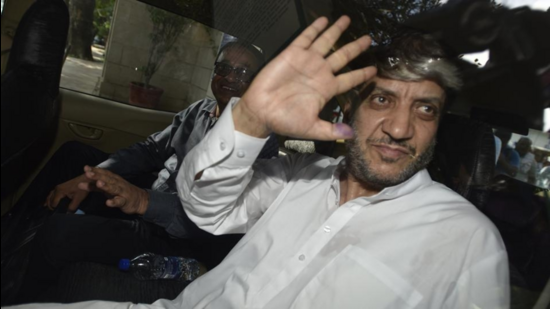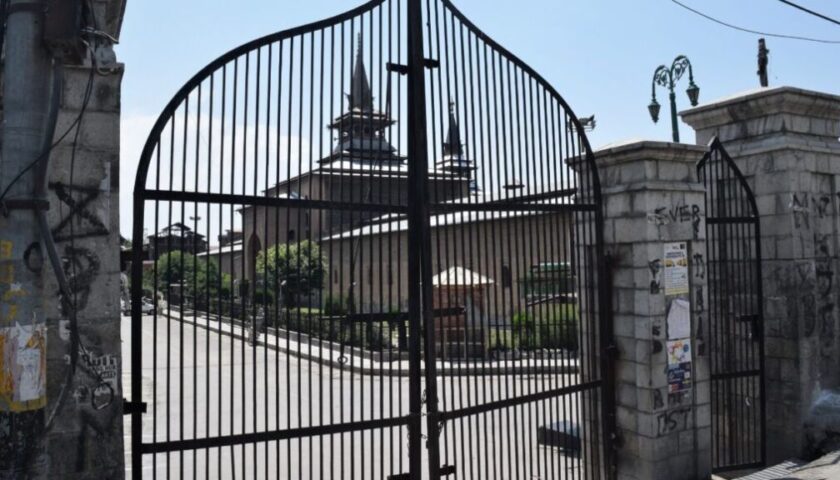Landmark ruling reinforces judicial resolve on UAPA-linked separatist trials; raises questions about prolonged detention and political messaging in post-370 Kashmir
New Delhi | June 13, 2025 — In a significant development in India’s legal and counter-terrorism landscape, the Delhi High Court has dismissed the bail plea of Kashmiri separatist leader Shabir Ahmad Shah, who has been under custody since 2019 in a high-profile terror funding case filed by the National Investigation Agency (NIA).
A division bench comprising Justice Navin Chawla and Justice Shalinder Kaur upheld the July 2023 order of the trial court, which had denied Shah’s interim release. Delivering a short but pointed verdict, the bench stated: “The present appeal is dismissed.”
The decision marks a crucial juncture in ongoing legal proceedings against top separatist leaders in the Kashmir Valley, many of whom are facing similar charges under the Unlawful Activities (Prevention) Act (UAPA).
What Is the Case Against Shabir Shah?
Shah, a veteran separatist leader and founder of the Jammu and Kashmir Democratic Freedom Party (JKDFP), is accused of conspiring with Pakistan-based operatives to fund terror-related activities in Kashmir through hawala networks and cross-Line of Control (LoC) trade routes.
According to the NIA’s chargesheet, Shah played a central role in facilitating monetary flows from overseas financiers, including designated terrorists and ISI-backed handlers. The money, investigators allege, was used to sponsor stone-pelting protests, mobilize violent unrest, and sustain separatist propaganda within Kashmir.
Though Shah’s legal team has repeatedly argued that no direct evidence links him to active terror plots, the prosecution maintains that he is part of a broader network designed to destabilize the Union territory.
Background of the Trial: A Delayed Legal Odyssey
Shabir Shah has been incarcerated since June 2019, shortly before the Indian government abrogated Article 370, which had granted Jammu & Kashmir special constitutional status.
His legal team has consistently challenged the prolonged nature of the trial, pointing out that:
-
Only 15 of over 400 listed witnesses have been examined so far.
-
Shah is not named in either the main NIA chargesheet or the first supplementary chargesheet.
-
Much of the alleged evidence is circumstantial or derived from confessional statements made under duress.
Despite these arguments, both the trial court and the Delhi High Court were unconvinced, citing the seriousness of charges, the ongoing nature of the investigation, and the risk that the accused might influence witnesses or tamper with evidence if released.
Legal Implications: A Test Case for UAPA Enforcement
The High Court’s verdict carries far-reaching legal significance. It sends a strong signal that the judiciary is unlikely to extend bail leniency in terror funding cases, especially under the stringent UAPA regime, where the threshold for bail is considerably higher.
Legal experts note that this ruling could influence other high-profile cases involving separatist leaders such as:
-
Yasin Malik, chief of the banned Jammu and Kashmir Liberation Front (JKLF), currently facing a life sentence in a parallel NIA case.
-
Nayeem Ahmad Khan, another Hurriyat figure detained in connection with cross-border funding operations.
This judgment aligns with the pattern of zero-tolerance policy adopted by both the judiciary and the executive in recent years.
“Granting bail in such cases would have wide implications,” said a senior legal analyst. “The judiciary is drawing a clear line between dissent and active support for militancy.”
Post-Article 370 Context: Political Messaging and Central Strategy
Since the revocation of Article 370 in August 2019, the central government has cracked down heavily on separatist leaders, Hurriyat factions, and other stakeholders who were previously seen as influential players in J&K’s political landscape.
The High Court’s decision is being interpreted by many observers as a political signal in addition to a legal ruling — one that reaffirms the Centre’s stance that dialogue is off the table with any leader involved in seditious or terror-related activities.
“The court’s ruling reinforces the Centre’s broader strategy to remove the ‘soft-separatist’ space from Kashmiri politics,” said Dr. Ajay Mehta, a former intelligence officer and political commentator. “This is part of the new narrative architecture being built around ‘Naya Kashmir’.”
Psychological Impact and Public Sentiment in Kashmir
While national and international media have focused on the legal merits of the case, the verdict may also deepen polarization and resentment in sections of Kashmiri society. Many locals view Shah — who has spent over three decades in and out of detention — as a political prisoner, not a militant.
The denial of bail may:
-
Strengthen public perception of selective justice.
-
Fuel alienation, especially among the youth who see few legal safeguards for political activists.
-
Add fodder to international human rights concerns about prolonged detention without conviction.
In contrast, pro-India constituencies and mainstream political figures may interpret the ruling as a necessary step toward long-term peace and rule of law in the conflict-prone region.
Security Ramifications: Boost for Agencies, Pressure on Prosecution
The court’s decision is expected to embolden security forces and intelligence agencies, who have often been criticized for the slow pace of prosecution in UAPA-related cases.
However, it also puts increased pressure on the NIA and prosecution teams to:
-
Speed up the examination of the remaining 385+ witnesses.
-
Present more substantive and admissible evidence.
-
Avoid the appearance of indefinite incarceration without conviction.
“The judiciary has backed the state. Now it’s time for the state to prove its case without further delays,” said a former Jammu & Kashmir High Court judge.
International Watchdogs & Human Rights Debate
Several international human rights organizations, including Amnesty International and Human Rights Watch, have criticized India’s use of preventive detention laws in Kashmir.
While Shah’s case hasn’t received the same level of global attention as Yasin Malik’s, the pattern of prolonged pre-trial detention is likely to fuel further scrutiny.
Already, UN special rapporteurs have expressed concerns over the broad interpretation of “terrorism” in the UAPA and its alleged misuse to target political dissenters.
The Road Ahead: What’s Next for Shabir Shah?
With his bail plea rejected, Shah is now expected to:
-
Remain in Tihar Jail, where he has been lodged since 2019.
-
Push for an expedited trial timeline through the Supreme Court or a higher constitutional bench.
-
Possibly file a fresh plea based on medical or humanitarian grounds, depending on his health condition.
Meanwhile, his party — now virtually inactive — has issued a brief statement calling the decision “unjust and politically motivated.”
Bottom-Line: Beyond One Man’s Case, a Broader Legal Turning Point
The Delhi High Court’s ruling against Shabir Shah is not just a routine legal setback — it is emblematic of India’s post-2019 Kashmir policy, where national security considerations often outweigh civil liberty concerns.
Whether one sees it as a landmark in legal resilience or a case of political overreach, the implications are undeniable:
-
Separatist politics in Kashmir stands further delegitimized.
-
The judiciary’s support for UAPA enforcement has been reinforced.
-
The debate on civil liberties, national security, and due process in India continues to evolve — with no easy answers.




